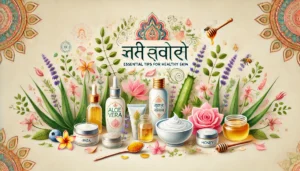
Skin care is an essential aspect of personal health and beauty, especially when considering the unique needs of diverse skin types. Those seeking effective skin care tips can find valuable insights in Hindi through WellHealthOrganic, making it accessible to a wider audience. Understanding skin care routines and products in one’s native language can enhance the effectiveness of personal care practices.
The blog post will explore various skin care strategies, including natural remedies and product recommendations tailored for different skin types. Readers can gain practical knowledge about maintaining skin health, combating issues like dryness or acne, and embracing holistic approaches.
With the rise of interest in organic and natural solutions, understanding skin care in Hindi empowers more individuals to take charge of their beauty regimens. This accessible knowledge not only benefits personal skin health but also encourages a broader conversation about wellness in diverse communities.
Fundamentals of Skin Care
Understanding skin care involves recognizing individual skin types and establishing a routine that addresses specific needs. Protecting the skin from external factors is essential for maintaining its health and appearance.
Understanding Skin Types
Identifying your skin type is crucial for selecting appropriate products. The main skin types include:
- Normal: Balanced moisture, few imperfections.
- Oily: Excess oil, prone to acne and shine.
- Dry: Lacks moisture, can feel tight and flaky.
- Combination: Mix of oily and dry areas.
- Sensitive: Easily irritated, reacts to products.
Knowing one’s skin type helps in choosing the right cleansers, moisturizers, and treatments. For instance, oily skin benefits from lightweight, oil-free products, while dry skin requires richer moisturizers. Regular assessments can ensure that the skincare regimen remains effective as the skin changes with seasons or age.
Daily Skin Care Routine
A daily skin care routine typically involves three essential steps: cleansing, moisturizing, and protecting.
- Cleansing: Use a gentle cleanser appropriate for the skin type. This removes dirt, oil, and makeup.
- Moisturizing: Applying moisturizer helps maintain hydration. For oily skin, lightweight gels work best, while cream-based moisturizers are ideal for dry skin.
- Toning: Optional but can help balance skin pH and remove residual impurities.
Consistency is key. Morning and evening routines help maintain skin’s health. Including treatments like serums can address specific concerns such as wrinkles or pigmentation.
The Importance of Sun Protection
Sun protection is vital for preventing skin damage and reducing the risk of skin cancer. UV rays can lead to:
- Premature aging: Wrinkles and fine lines.
- Sunburn: Immediate damage causing redness and pain.
- Hyperpigmentation: Dark spots and uneven skin tone.
Using a broad-spectrum sunscreen with at least SPF 30 is recommended. Reapplication every two hours during sun exposure is crucial. Wearing protective clothing and seeking shade also aids in safeguarding the skin. Regular skin checks help detect any changes early, contributing to long-term skin health.
Advanced Skin Care Techniques
Advanced skin care encompasses specialized methods that enhance skin health and appearance. By incorporating targeted techniques, individuals can achieve clearer, more youthful skin.
Exfoliation Methods
Exfoliation is crucial for removing dead skin cells and promoting cell turnover. Two primary types are physical and chemical exfoliation.
Physical exfoliation involves using scrubs or tools like brushes or sponges. It requires moderate pressure to avoid irritation. Chemical exfoliation uses acids (AHAs, BHAs) to dissolve bonds between skin cells. Common options include glycolic acid and salicylic acid.
Frequency is important. Typically, it’s advisable to exfoliate 1-3 times per week, depending on skin type. Those with sensitive skin should opt for less aggressive exfoliation to prevent redness or irritation.
Moisturizing Strategies
Effective moisturizing retains skin hydration, which is key for maintaining skin barrier function. It’s important to choose the right moisturizer based on skin type:
- For oily skin: Lightweight, oil-free gels or lotions work best.
- For dry skin: Creams with occlusive ingredients like shea butter or hyaluronic acid provide essential hydration.
In addition to conventional moisturizers, incorporating hydrating serums can enhance moisture levels. Ingredients like glycerin and ceramides are beneficial. Application should occur on damp skin for better absorption.
Anti-Aging Solutions
Anti-aging solutions aim to diminish the appearance of fine lines, wrinkles, and age spots. Key products in this category include retinoids, antioxidants, and peptides.
Retinoids, derived from vitamin A, stimulate collagen production and accelerate cell turnover. They can be irritating initially, so starting with lower concentrations is advisable.
Antioxidants like vitamin C and E combat oxidative stress, helping to protect the skin from environmental damage. Peptides support skin structure by promoting collagen and elastin synthesis.
Regular use of sunscreen is crucial in preventing premature aging. Broad-spectrum options with SPF 30 or higher should be applied daily.
Vaishno Devi VIP Darshan Ticket Price: An Overview for Pilgrims
When planning a pilgrimage to Vaishno Devi, many visitors seek information on the VIP dars…